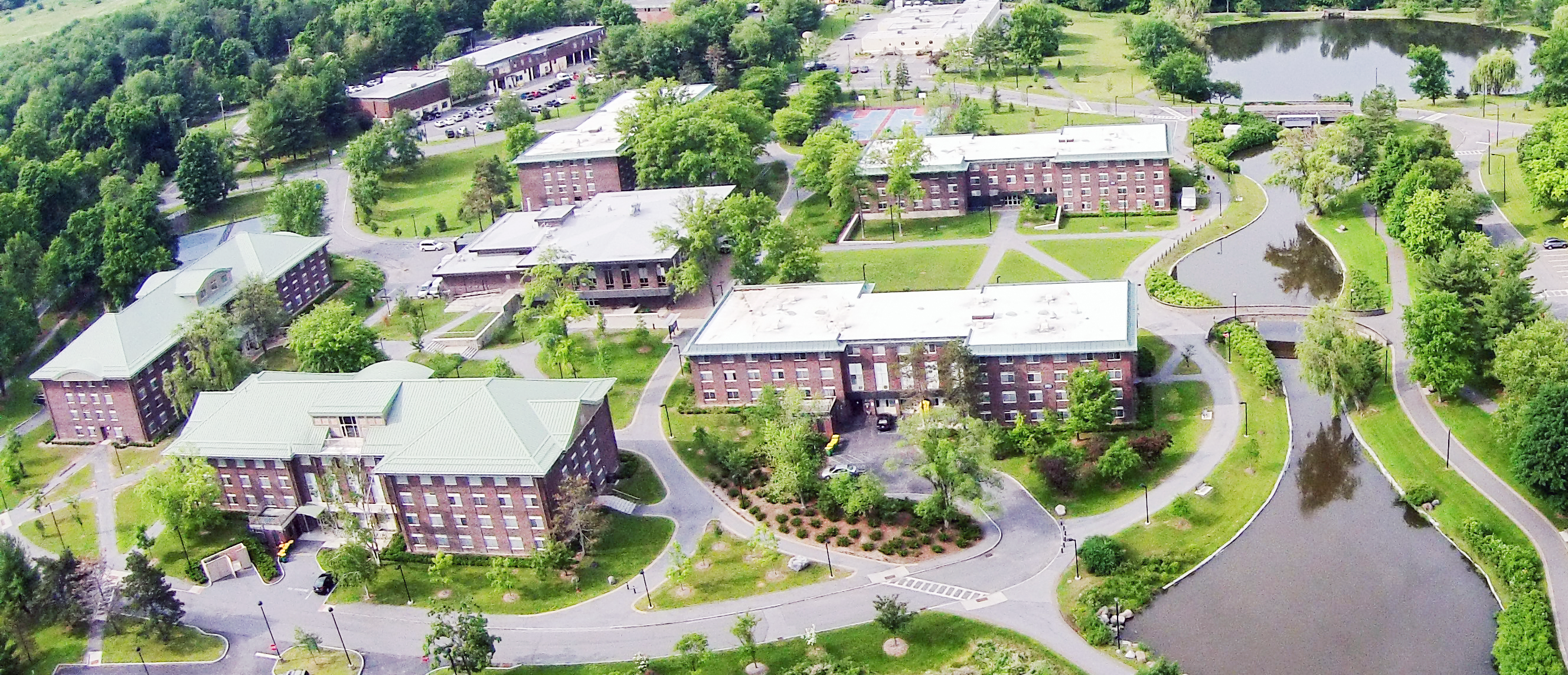
The SUNY New Paltz College Council today unanimously passed a resolution to assign new names to Hasbrouck Complex buildings.
The selected names carry local meaning, a theme that drew strong support in a campus-wide survey. The approved names, local geographic significance, and origin, are:
- Shawangunk Hall: Pronounced ‘SHON-gum,’ this hall is named for the Shawangunk Ridge visible from campus. The meaning is translated from the local indigenous Munsee Lenape as “in the smoky air.”
- Awosting Hall: Named after one of the “sky” lakes on the Shawangunk Ridge, “Awosting” is adapted from the Native American (Munsee) word, Aiaskawosting, “place of grassy hills.”
- Minnewaska Hall: Named after another sky lake on the Ridge, “Minnewaska” derives from the combination of two Dakota or Sioux words, mini or mine (for water) and waste (wah -shday) (for good).
- Mohonk Hall: Named after another sky lake on the Ridge adjacent to Mohonk Mountain House, a 150-year old resort owned by the Smiley family. “Mohonk” is derived from the Delaware Indian word Mogonck, which some believe to mean “lake in the sky.”
- Ashokan Hall: This name is derived from an Iroquois word for “place of fish.” From 1967-2008 the Ashokan Field Campus, an outdoor education, conference and retreat center located in the Catskill Mountains of upstate New York, was part of SUNY New Paltz. It is now the Ashokan Center operated by Jay Ungar and Molly Mason, folk musicians who in 1982 wrote and composed “Ashokan Farewell,” a farewell waltz featured in the PBS miniseries “The Civil War,” produced by Ken Burns. Ashokan is also the name of the nearby reservoir that supplies water to New York City.
- Peregrine Dining Hall: Named for the Peregrine falcons that soar above the Ridge and the local sky lakes. These birds have resurged after facing near-extinction; thus the Peregrine has local significance as a symbol of resiliency and hope. Peregrine also refers to a wanderer from foreign lands, and our campus has always welcomed students regardless of their origins.
The Council selected these names from a list recommend by a study group of College Council members, faculty, staff, students, alumni and a Historic Huguenot Street Board member. The study group drew on survey responses from more than 3,000 students, faculty, staff, alumni and community members, including Huguenot descendants, in arriving at their recommendations.
“I am grateful to the study group for their thoughtful efforts in this process, and to those who provided thoughtful input on the survey that informed their work,” said President Donald P. Christian. “The recommendation to have the names reflect our local beauty is most fitting.”
Passage of this resolution follows the College Council’s Feb. 21 approval of the resolution to remove six campus buildings (Bevier Hall, Crispell Hall, Deyo Hall, DuBois Hall, Hasbrouck Dining Hall and Lefevre Hall), named for original Huguenot patentees of the Village of New Paltz who also owned enslaved people.
The next steps of this process will include the development of a single resolution to remove current names and assign new ones to these buildings, which will go to the SUNY Board of Trustees for review.
“We will make every effort to bring this matter to the Board as early as possible, hopefully this spring,” President Christian said.
Facilities Operations staff have begun working with campus administration to begin addressing infrastructure issues that will be affected by building name changes. This includes updating fire safety systems, 911 addresses, room inventories and other databases, and considering the impact on campus tours, the mailroom and the Department of Residence Life.
Additionally, SUNY New Paltz is moving ahead with other recommendations of the Diversity and Inclusion Council. A working group of students, faculty and staff is developing concepts for a contemplative space and other ways to present a more complete history of our campus and our community for future students and visitors.
“I am committed to ensuring that we keep the Huguenot names and the many contributions of these families alive on our campus,” President Christian said. “As this matter moves to Albany for final resolution, I again wish to thank members of our campus community for their participation in this process, which began in August 2017. This process is a stellar example of shared governance with students, faculty, the Diversity & Inclusion Council, college leadership and College Council members and engagement with our alumni.”
Please use this link to learn more about the Hasbrouck Complex Dialogue.

